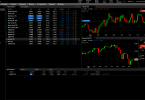If you want to trade CFDs, your choice basically comes down to direct market access providers, or market makers, sometimes referred to as over-the-counter providers. Here are the factors that you need to bear in mind when you are picking a provider to suit you.
Are you an Active Trader, a Scalper or a Longer-Term CFD Trader?
When comparing the two main types of CFDs available on the market you need to consider whether your trading style and the instruments that you trade suit either a Market Made or Direct Market Access model.
Day Trading Contracts For Difference
It’s generally agreed that if you are an active day trader or a scalper you need to go with direct market access for a number of reasons. To effectively day trade CFDs you need a fast platform, the ability to execute your orders quickly and preferably no requotes. A requote is when you input a market order to buy at say $2.80 but the CFD provider is unable to match the deal and instead returns back something like ‘Sorry, that price is no longer available, would you like to deal at $2.82? With direct market access your order goes directly onto the underlying exchange, and you’re not likely to be re-quoted once you place the order, as occasionally happens when dealing with a market maker. Thus with DMA when you input an order for, say, 5000 CFDs at $2.80 and there are 5000 shares available in the in the underlying exchange your trade will always be accepted and executed at that price provided that another market participant doesn’t hit that price before you. With direct market access you also become a price maker, as you can see the market depth and the levels of the pending orders on the exchange and can participate directly in the underlying order book of the stock which you are looking to trade.
Other advantages with the direct market access model include that the prices directly reflect the underlying market, which is not the case with market made CFDs. Execution speed is usually quicker and you also have the opportunity to participate in the opening and closing auctions on the exchanges, which is an advantage if you are an active trader since the opening and closing phases of the market are often the most liquid. When day trading CFDs on margin where you are speculating on very small price fluctuations the speed at which your orders are dealt is paramount and each second could mean money won or lost and slippage could make a difference between a losing or winning trade. When you place your order into the market, you will be filled at the best prices available which may even mean that you can get a part fill up to the offered volume, completing your order at the next price level.
Longer Term Trading
Market Made CFDs are much popular with longer term traders and those that choose to trade indices and forex. If you are a longer-term CFD trader most of the advantages of DMA trading won’t matter to you. In addition, if you wish to trade indices and currencies then you have to choose to go with the market maker model as they can’t be traded directly on an exchange. When you trade these markets, you will often find they are not directly charged a commission as this is included in the bid-offer spread.
Regarding the market making model, this may be the only one providing you access to the underlying financial securities that you want to trade in. As many of the brokers are just market makers they can adjust the tick value on instruments such as S&P, Dow, Oil & Copper to make it more tradable for small accounts as well instead of trading the full futures contracts or mini’s. Certainly, you will usually find a larger range of trading opportunities, including commodities, currencies and indices. Unlike the DMA, if the entire volume you want is not available at a price, then you will be re-quoted for the order rather than receiving a partial fill. And with the market maker model, the provider may offer wider spreads which will eat into your profits. However, if you want to use guaranteed stop losses, then you must go with the market making provider, as there is no way that the exchange model can freeze and guarantee prices.
DMA is a more sophisticated product. Rather than being presented with a bid/offer quote, the trader is instead given direct access to the exchange’s electronic order book. This enables him to become a price maker rather than a price taker and enter his own bid and offer into the market in the hope of getting a favourable fill. DMA is available on UK, European, US and international CFDs with a commission charge of about 0.10%.
So which CFD broker is best?
Deciding on whether to go with the Market Maker or DMA CFD route only takes a little bit of due diligence and usually depends on which markets you are looking to trade and how long you desire to hold a given trade. The shorter your timeframe for trading the more you’ll need to rely on a DMA CFD provider but if you wish to trade over longer periods of time and need access to global markets, then a Market Maker might be more appropriate (in practice if you’re serious you would ultimately want accounts with both types of brokers).
The advantage of Direct Access is fast order execution at the true underlying cash market price. Interacting directly with the London Stock Exchange’s SETS electronic order book may also enable clients to trade within the usual bid/offer spread and gives them the opportunity to participate in the opening, closing and intraday auctions, where very often the best prices of the day are achieved.
However, the common style of CFD is the market made variety, usually this kind of trading model is offered by CFD brokers that also offer spread betting and originate in the United Kingdom where spread betting is widespread. To conclude, there are advantages and disadvantages to each type of CFD provider and the one that is most appropriate for you depends on your trading style and whether you need the quick execution and exactness of DMA CFDs or the versatility of the market made CFD types. But if you can swing a way to trade them, do so! You won’t find many trading educators that understand them though or how to really get the big gains out of them, it’s still a niche very much at this point in time, and your results are only limited by your creativity with your money management strategies. It is also possible to find CFD brokers that offer both types of CFD, so if you are undecided on your trading strategies you may want to consider this rather than setting up accounts with multiple providers. This is especially convenient as you might be able to cross-margin share CFDs with index and forex trading positions. If you have a bias for a particular type of trading or market, then the decision may relatively easy. If not, then you may want to try provider who can supply both types and see how you get along. One side-benefit to having both the DMA and market made CFD types in one trading platform is that it saves on paperwork as you only need to maintain one account which simplifies the preparation of tax returns forms.







